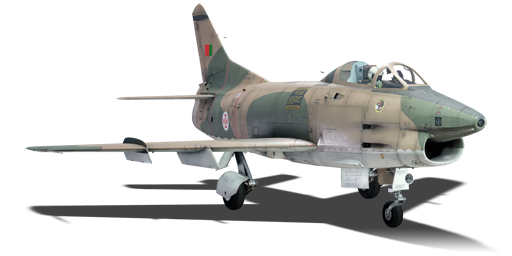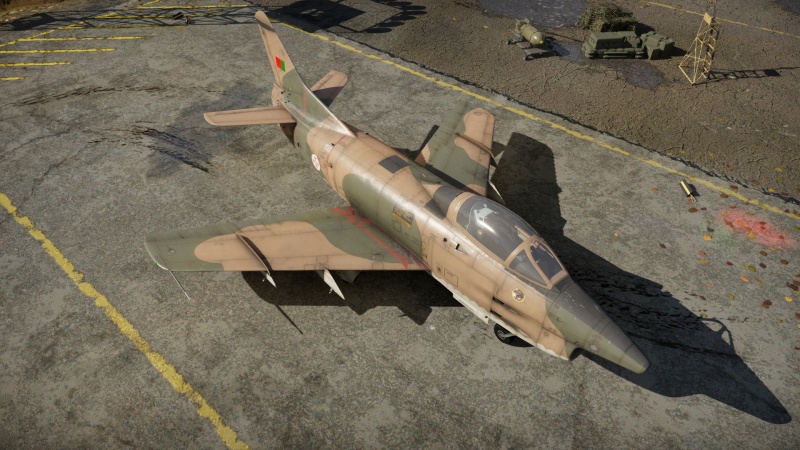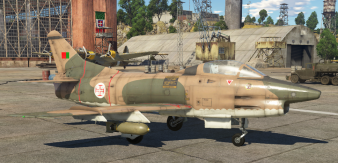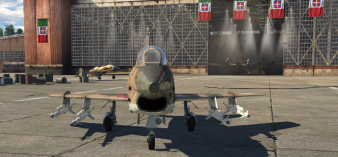Difference between revisions of "G.91 R/4"
m (→Details) |
(Edits) |
||
| Line 35: | Line 35: | ||
! rowspan="2" | Characteristics | ! rowspan="2" | Characteristics | ||
! colspan="2" | Max Speed<br>(km/h at 0 m - sea level) | ! colspan="2" | Max Speed<br>(km/h at 0 m - sea level) | ||
| − | ! rowspan="2" | Max altitude<br>( | + | ! rowspan="2" | Max altitude<br>(metres) |
! colspan="2" | Turn time<br>(seconds) | ! colspan="2" | Turn time<br>(seconds) | ||
| − | ! colspan="2" | Rate of climb<br>( | + | ! colspan="2" | Rate of climb<br>(metres/second) |
| − | ! rowspan="2" | Take-off run<br>( | + | ! rowspan="2" | Take-off run<br>(metres) |
|- | |- | ||
! AB !! RB !! AB !! RB !! AB !! RB | ! AB !! RB !! AB !! RB !! AB !! RB | ||
| Line 46: | Line 46: | ||
|- | |- | ||
! Upgraded | ! Upgraded | ||
| − | | 1,097 || 1,084 || 24. | + | | 1,097 || 1,084 || 24.8 || 26.0 || 49.3 || 39.0 |
|- | |- | ||
|} | |} | ||
| Line 73: | Line 73: | ||
|- | |- | ||
| {{Specs|destruction|body}} || {{Specs|destruction|gear}} || 589 || 550 || 345 || ~11 || ~5 | | {{Specs|destruction|body}} || {{Specs|destruction|gear}} || 589 || 550 || 345 || ~11 || ~5 | ||
| − | |||
| − | |||
| − | |||
| − | |||
| − | |||
| − | |||
| − | |||
| − | |||
| − | |||
| − | |||
|- | |- | ||
|} | |} | ||
Revision as of 11:43, 12 May 2021
| This page is about the premium Italian jet fighter G.91 R/4. For other uses, see G.91 (Family). |
Contents
Description
The G.91 R/4 is a gift rank V Italian jet fighter with a battle rating of 8.3 (AB), 8.7 (RB), and 9.0 (SB). It was introduced in Update 1.87 "Locked On".
The R/4 is a variant of the G.91 jet fighter that has been modified for ground attack, allowing it access to a competitive selection of air-to-ground ordnance such as bombs, rockets, and high-explosive air-to-ground missiles. The R/4 also has the option to equip two different types of air-to-air missiles; the IR-tracking AIM-9B Sidewinder missile, or the command-guided AA-20 Nord missile.
The G.91 R/4 is a very nimble fighter with relatively average top speed and fairly good acceleration. Best played as a support fighter, the G.91 R/4 can use its incredible roll and turn rates to quickly get guns on target, as well as to dodge the typically less manoeuvrable fighters that it shares its battle ratings with.
There are few changes between the Pre-serie, R/1, R/3 and the R/4, with exception of the armament, and this guide can be considered universal for all listed aircraft.
General info
Flight performance
The G.91 was intended to replace the F-86A Sabre in German, Portuguese and Italian service and it shows. With an empty weight of only 3,100 kg (6,800 lbs) and a takeoff weight of 5,500 kg (12,100 lbs) the Gina is in the weight class as the P-51D and MiG-9, yet severely lighter than most other jets and losing about one and a half tonnes compared to the Sabre A.
Although only outputting a meagre 22 kN of thrust, this first look disadvantage is literally outweighed by the high thrust to weight ratio of 0.73 empty (0.41 full). This makes the Gina an excellent dogfighter as jet fighters maintain both their top speed, climb and sustained turn-rate by their engine power rather than other flight characteristics. It can easily reach its own terminal speed (1,011 km/h, 921 ft/s) and self-destruct in level flight.
Lacking in straight wings and leading wing slats, the stall speed for the G.91 is higher than the low weight leads one to assume. One should hence be wary of many older jet types with said features, as after bleeding too much speed they can easily out-manoeuvre the Gina.
Starting with 20 min of fuel, gaining the climb speed of 800 km/h IAS (sustainable @ 7-8°; 730 ft/s) takes a mere ~80 seconds with 20 predicated for taking off at 230 km/h or 210 ft/s IAS. An Immelmann at 800 km/h will gain 1000 m and lose 300 km/h. A hard 180° turn at the same speed takes >100 km/h and may lose up to 60 m.
| Characteristics | Max Speed (km/h at 0 m - sea level) |
Max altitude (metres) |
Turn time (seconds) |
Rate of climb (metres/second) |
Take-off run (metres) | |||
|---|---|---|---|---|---|---|---|---|
| AB | RB | AB | RB | AB | RB | |||
| Stock | 1,066 | 1,042 | 11000 | 27.4 | 28.0 | 30.4 | 29.5 | 850 |
| Upgraded | 1,097 | 1,084 | 24.8 | 26.0 | 49.3 | 39.0 | ||
Details
| Features | |||||
|---|---|---|---|---|---|
| Combat flaps | Take-off flaps | Landing flaps | Air brakes | Arrestor gear | Drogue chute |
| ✓ | ✓ | ✓ | ✓ | X | ✓ |
| Limits | ||||||
|---|---|---|---|---|---|---|
| Wings (km/h) | Gear (km/h) | Flaps (km/h) | Max Static G | |||
| Combat | Take-off | Landing | + | - | ||
| 1128 | 345 | 589 | 550 | 345 | ~11 | ~5 |
| Optimal velocities (km/h) | |||
|---|---|---|---|
| Ailerons | Rudder | Elevators | Radiator |
| < 800 | < 650 | < 660 | N/A |
Engine performance
| Engine | Aircraft mass | ||||||
|---|---|---|---|---|---|---|---|
| Engine name | Number | Empty mass | Wing loading (full fuel) | ||||
| Bristol Orpheus MK.803 | 1 | 3,477 kg | 289 kg/m2 | ||||
| Engine characteristics | Mass with fuel (no weapons load) | Max Takeoff Weight | |||||
| Weight (each) | Type | 9m fuel | 20m fuel | 30m fuel | 32m fuel | ||
| 380 kg | Axial-flow turbojet | 3,837 kg | 4,269 kg | 4,662 kg | 4,740 kg | 5,800 kg | |
| Maximum engine thrust @ 0 m (RB / SB) | Thrust to weight ratio @ 0 m (101%) | ||||||
| Condition | 100% | 101% | 9m fuel | 20m fuel | 30m fuel | 32m fuel | MTOW |
| Stationary | 2,212 kgf | 2,234 kgf | 0.58 | 0.52 | 0.48 | 0.47 | 0.39 |
| Optimal | 2,212 kgf (0 km/h) |
2,234 kgf (0 km/h) |
0.58 | 0.52 | 0.48 | 0.47 | 0.39 |
Survivability and armour
- 40 mm Bulletproof glass in front of the pilot
- 6.5 mm Steel plate, starts in the pilot's seat, goes below the pilot, ends in front of the pilot
- 6.5 mm Steel plate below a fuel tank in the centre-front of the fuselage
- 6.5 mm Steel plate below a fuel tank in the centre-rear of the fuselage
- Self-sealing fuel tanks (6 mid-fuselage)
Though the G.91 R/4 does have a decent amount of armour spaced out between the centre and front of the fuselage, the steel plates will only be sufficient to protect the pilot and aircraft from lower calibre fire (7.92 mm to 7.62 mm machine guns will only penetrate at very close ranges). And, thanks to the sacrifices made to lighten the aircraft, the airframe is not particularly reinforced. The wings are very thin, and susceptible to being out-right broken off by most-all primary armaments the G.91 will face at its tier, and the fuselage is full of juicy fuel tanks as well as the single engine of the R/4. Even more so than most planes, the G.91 R/4 is not capable of taking any hits. Even low calibre fire, such as that from .50 calibre machine guns, can cripple an R/4 nigh-immediately, and necessitate an immediate return-to-base.
Modifications and economy
Armaments
Suspended armament
The G.91 R/4 can be outfitted with the following ordnance:
- 4 x 12.7 mm M3 Browning machine guns, nose-mounted (300 rpg = 1,200 total)
- 4 x 12.7 mm M3 Browning machine guns + 38 x FFAR Mighty Mouse rockets
- 4 x 12.7 mm M3 Browning machine guns + 2 x AA-20 Nord missiles
- 4 x 12.7 mm M3 Browning machine guns + 2 x AS-20 Nord missiles
- 2 x 12.7 mm M3 Browning machine guns + 4 x AS-20 Nord missiles
- 2 x 12.7 mm M3 Browning machine guns + 4 x AA-20 Nord missiles
- 2 x 12.7 mm M3 Browning machine guns + 2 x 500 lb AN-M64A1 bombs + 2 x AS-20 Nord missiles (1,000 lb total)
- 2 x 12.7 mm M3 Browning machine guns + 2 x 500 lb AN-M64A1 bombs + 2 x AA-20 Nord missiles (1,000 lb total)
- 4 x 12.7 mm M3 Browning machine guns + 4 x AIM-9B Sidewinder missiles
- 4 x 12.7 mm M3 Browning machine guns + 2 x 500 lb AN-M64A1 bombs (1,000 lb total)
Featuring a wide range of ordnance the G.91 R/3 can be equipped for any role from ground to air combat, though it prefers air superiority.
The M3 Browning is a new weapon in the Italian arsenal at rank V and compared to the previous experiences a let down. The rate of fire is phenomenal, but the small calibre and ammo size put a serious damper to the mood, that is in comparison of course. In practise and with good aim, it can easily shred four fighters. The high bullet velocity and fire rate is quite the advantage in the fast pace world of jet combat, ensuring hits in deflection shots were the lower rate of fire found in the Soviet jet fighters might have failed the pilot.
Yet one will always look onto greener pastures, especially as the Gina only has four guns unlike all other Browning armed jets. No matter how you turn it, the armament is only manageable with skill and outright bad for a beginner.
For air-to-ground purposes, the G.91 R/4 is similar to the G.91 pre-serie and G.91 R/1, both its predecessors, in loadout options sharing the same FFAR Mighty Mouse rocket option as well as the choice of a pair of 500 lb bombs. However, the G.91 R/4 has an additional and unique option; the AS-20 Nord air-to-ground missile, with a reasonable penetration value (83 mm RHAe) but incredible warhead size of (just under) 30 kilograms of TNT. Skilled use of the missile can allow for a more accurate fire at longer ranges especially versus more dangerous vehicles like self-propelled anti-aircraft guns.
Air-to-air ordnance selection is where the G.91 R/4 stands out from its brethren; the G.91 R/4 is the lowest-ranked jet in the Italian aircraft tree to gain access to air-to-air missiles, with access to the American AIM-9B infrared-guided missile, and one of only two jets in-game (alongside the Super Mystére B.2) to have the option of loading the unique AA-20 Nord air-to-air missiles; keyboard guided missiles with a 15 metre proximity fuse. Unlike infrared-guided missiles in War Thunder, the AA-20 Nords do not warn targets of a missile launch giving R/4 pilots the element of surprise, and the Nord's proximity fuse increases the chance of long-range launches striking a target, though these perks come at the demand of a much higher skill floor for usage.
Usage in battles
Due to the G.91 R/4's notably lower speed and high-end acceleration as compared to its contemporaries, the R/4 should be played as a support fighter; meaning the pilot should seek to stick near teammates rather than hunting targets solo, and opt to pick off hostile aircraft that are engaged and distracted with/by allied fighters. The G.91 airframe is exceptionally agile, and the R/4 is no exception; even heavily manoeuvring targets are easy for this plane to keep the nose on. The plane's exceptional roll and turn rates are its biggest strengths, and the pilot should seek to use that to their advantage rather than attempting to fight speed or energy battles.
Make use of the G.91 R/4's varied suspended armaments to dispatch a variety of targets. The AIM-9B is very easy to use missile and can force faster targets to manoeuvre, slowing them down, and can sometimes even net target destructions. Be careful when using this missile around friendlies though, as a misguided Sidewinder will destroy allied aircraft. The AA-20 Nord is a much more difficult missile to use, but it has a far longer effective range and can often surprise enemies who expect a warning from enemy missile launches. Use the massive range and proximity fuse to take down faster targets flying away from you, and consider using them to destroy bombers such as the often-seen Vautour IIB, Vautour IIA, and Israeli Vautour IIA, who not only are far less able to dodge missiles but also have larger airframes that trigger the proximity fuse from longer distances.
Pros and cons
Pros:
- Exceptional manoeuvrability, with very high roll and turn rates
- Varied and effective suspended armament choices
- Access to air-to-air missiles, including the AA-20 Nord
- Access to the AS-20 Nord air-to-ground missile
Cons:
- Relatively low calibre primary armament (four .50 cal Brownings)
- Slower than most of its contemporaries
- Very fragile airframe
- Poor energy retention
History
The G.91 R/3 was the primary West German variant of the Fiat-made light jet fighter, with 50 built in Italy and another 294 under license in West Germany. It had more powerful armament, added two wing hardpoints, and improved avionics compared to the Italian G.91 R/1s. The 50 R/4 that followed were identical to the R/3 other than in terms of armament. The R/4 was supposed to have been sold to Greece and Turkey, but after that sale fell through they entered West German service instead. The R/4 was also operated by the Portuguese Air Force (Força Aérea Portuguesa) during its colonial wars against Angola, Mozambique and other domains of the former Portuguese empire, to replace the obsolete F-84 Thunderjets and F-86 Sabres. This aircraft had the nickname of 'Gina' in Portuguese service.
Media
- Skin: G.91 R/3 n 5454 NATO's Air Tattoo Tigermeet event - by LeiteArts10
- Skin: Fictional USAF G.91 R/4 by Kammage77
See also
External links
| Fiat Aviation (Fiat Aviazione) | |
|---|---|
| Fighters | CR.32 · CR.32 bis · CR.32 quater |
| CR.42 · Marcolin's C.R.42 CN · ▀Marcolin's C.R.42 CN | |
| G.50 serie 2 · G.50 AS serie 7 | |
| G.55 sottoserie 0 · G.55 serie 1 · G.55S | |
| G.56 | |
| Jet fighters | G.91 pre-serie · G.91 R/1 · G.91 Y · G.91 YS |
| ▄F-86K* | |
| ▄F-104G* · F-104S* · F-104S.ASA* · ▄F-104S TAF* | |
| Strike aircraft | F.C.20 Bis |
| Bombers | B.R.20DR · B.R.20M M1 |
| Export/Captured | J11 · ▀CR.42 |
| ▀G.50 serie 2 · ▀G.50 AS serie 7 | |
| ◄G.91 R/3 · ◄G.91 R/4 · G.91 R/4 | |
| *Licensed | |
| See also | North American Aviation · Lockheed Martin |
| Italy jet aircraft | |
|---|---|
| Aerfer | Sagittario 2 · Ariete |
| Fiat | G.91 pre-serie · G.91 R/1 · G.91 R/4 (Portugal) · G.91 Y · G.91 YS |
| AMX International | AMX · AMX A-1A (Brazil) |
| Panavia | Tornado ADV · ▄Tornado IDS · ▄Tornado IDS (1995) |
| Foreign: | |
| Vampire | Vampire FB 52A |
| F-84 | ▄F-84F · ▄F-84G-21-RE |
| F-86 | CL-13 Mk.4 · ▄F-86K |
| F-104 | ▄F-104G · F-104S · ▄F-104S TAF (Turkey) · F-104S.ASA |
| F-16 | ▄F-16A ADF |
| AV-8 | ▄AV-8B Plus |
| Hungary | |
| Mikoyan-Gurevich | ◔MiG-15bis · ◔MiG-17PF · ◔MiG-21MF · ◔MiG-21bis-SAU · ◔MiG-23MF · ◔MiG-29 |
| Ilyushin | ◔IL-28 |
| Sukhoi | ◔Su-22M3 |
| Saab | ◔JAS39EBS HU C |
| Italy premium aircraft | |
|---|---|
| Fighters | CR.32 bis · Marcolin's C.R.42 CN · He 112 B-1/U2 · Re.2001 gruppo 22 |
| C. 202D · IAR-81C · ▄Spitfire Mk Vb/trop · ◐Bf 109 F-4 · ◐Bf 109 G-2 · G.55S | |
| Jet fighters | Ariete · G.91 R/4 · ▄F-104S TAF |
| Strike aircraft | ◐Bf 110 G-4 · Hs 129 B-2 (Romania) · Ro.57 Quadriarma |
| AMX A-1A | |







